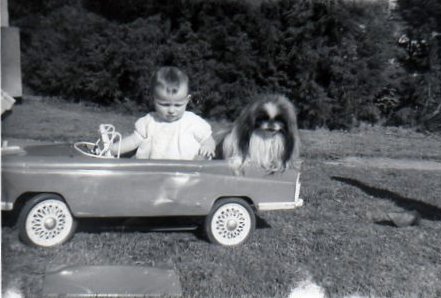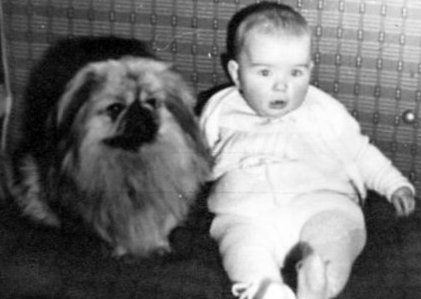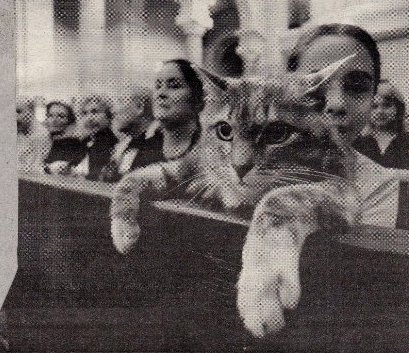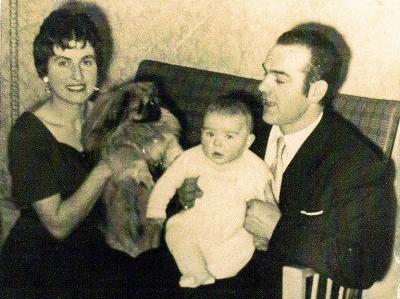Sparks to light
the fire

"He will never permit the righteous to be moved"
With reference to yet another of Fr. Mario's stimulating articles: The Art of Belonging - I am reminded of a memorable evening some forty years ago, not in a monastery as he writes, but in a family-run restaurant called "Rose Maree" in the island of Rhodes.
We were a group of Irish tourists dining and wrestling for the use of the microphone. Entertainers and orators fused together in a friendly cacophony of gregarious conviviality. Pressed into regaling the fast-filling diningroom with selections of song, verse and story and being speechless with exuberance at the witticism of our own jokes.
All eyes were focused on Stefan, from whom peace, joy and serenity emanated. Who was Stefan? A middle-aged Danish veterinary surgeon in the mould of James Mason, and director of a zoo in his country, who, he told us, had been suffering from chronic melancholia for 3O years. That night he had emerged from this valley of despair and was having the time of his life with the group.
His incredulous wife Helena sat beside him, as guests of the wilde Irish, and as participants in "the art of belonging". While other countries excel in the mastery of gathering the wood- pile, the Irish are consummately adept at producing the sparks.
And so it was, during those unforgettable weeks, when the fun and wit in that small hotel were infectious. It has been well said: 'He who does not speak to whom he does not know, slowly dies'.
Approached one morning by a very doleful Stefan who sought to unlock the secret of this ongoing merriment and who sincerely wanted to know to what it could be ascribed, I replied that I could only speak for myself, having known the group just for days, but for me, it was total belief in the veracity of the promises of God.
Being an atheist, he told me he was stunned by my statement. That afternoon he approached me again. Would I give him a minute of my time? Three hours later, having told him about my own deeper conversion to Christianity, he was, nonetheless, still unconvinced. All efforts to persuade him to TALK to God to ask Him if He existed, had been in vain.
Finally, in desperation, and at the risk of becoming an object of derision, I ventured to tell him the story of Scruffy the cat. At the end of my long garden in Dublin, a dirty, white cat emerged from the trees. Having recently lost the last of a line of adored Pekingese dogs, I had vowed never again to be tied down by an animal, and so, dumping a bowl of food near the creature, I would dash back without making eye contact.
Eventually, the inevitable happened. Opening the back door, I found a heavily pregnant Scruffy seated firmly on the mat with a look of tearful entreaty in her sea-green eyes. I was devastated. The case was hopeless. What to do in time of hopelessness? I knew. "Cast your burden on Me", He told me, "and I will sustain you,
"HE WILL NEVER PERMIT THE RIGHTEOUS TO BE MOVED OR TO FALL' ( Psalm 55:22).
That is precisely what I did. And the result? Scruffy never had the kittens. It had been a phantom pregnancy.
I was scared to look at Stefan. I need not have worried. He got visibly agitated, rushed in and splashed his face several times. Emerging, he said: "I've got the message. Now I believe. The exact experience was my very own at my zoo. It was a giraffe. It is virtually unprecedented. I believe in your God Anita. You have me."
"He prayeth best who loveth best, all things both great and small. For the dear God who loveth us. He made and loveth all!". Samuel Coleridge.
"God, if you exist (and I don't know if you do ), and if you can hear this prayer ( and I don't know if you can ), I want to tell you that I am an honest seeker after the truth. Show me if Jesus is your Son and the Saviour of the world. And if you bring conviction to my mind, I shall trust Him as my Saviour and follow Him as my Lord".
No-one can pray such a prayer and be disappointed. God is no man's debtor. He honours all earnest search. He rewards all honest seekers. Christ's promise is plain : 'Seek and you will find '. ( Rev. John R W Stott ).
Prayer for the Light of Truth.
O my God, I confess that you can enlighten my darkness. I confess that You ALONE can. I WISH my darkness to be enlightened. I do not know whether You will; but that you CAN and that I wish, are sufficient for me to ASK, what You at least have not forbidden my asking. I thereby promise that by Your grace which I am asking, I will embrace whatever I at length feel certain is the truth, if ever I come to be certain. And by Your grace I will guard against all self-deceit which may lead me to take what nature would have, rather than what reason approves.
(Blessed John Henry Newman).
HOLY AND UNHOLY FEAR by Fr. onald Rolheiser (Ron rolheiser .com).
Not all fear is created equal, at least not religiously.There's a fear that's healthy and good, a sign of maturity and love. There's also a fear that's bad, that blocks maturity and love. But this needs explanation.
There's a lot of misunderstanding about fear in religious circles, especially around the scriptural passage that says that the fear of God is the beginning of wisdom. Too often texts like these, as well as religion in general, have been used to instil an unhealthy fear in people in the name of God. We need to live in "holy fear", but holy fear is a very particular kind of fear which should not be confused with fear as we normally understand it. What is holy fear? What kind of fear is healthy? What kind of fear triggers wisdom?
Holy fear is love's fear, namely, the fear of wisdom that is inspired by love. It's a fear based on reverence and respect for a person or a thing we love. When we genuinely love another person we will live in a healthy anxiety, a worry that our actions should never grossly disappoint, disrespect or violate the other person. We live in holy fear when we are anxious not to betray a trust or disrespect someone. But this is very different from being afraid of being punished.
Bad power and bad authority intimidate and make others afraid of them. God is never that kind of power or authority. God entered our world as a helpless baby and God's power still takes on that modality.
...God is Love, a benevolent power, a gracious authority, not someone to be feared. Indeed, God is the last person we need to fear. Jesus came to rid us of fear. Virtually every theophany in Scripture (an instance where God appears) begins with the words: "Do not be afraid!" What frightens us does NOT come from God.
In the Jewish scriptures, the Christian Old Testament, King David is revealed as the person who has best grasped this..David is depicted as the figure who best exemplified what it means to walk on this earth in the image and likeness of God, even though at one point he grossly abuses that trust. Despite his great sin, it is David, not Moses or the prophets, to whom Jesus attributes his lineage. David is the Christ figure in the Old Testament. He walked in holy fear of God, and never in unhealthy fear.
To cite just one salient example: the Book of Kings recounts an incident where David is one day returning from battle with his soldiers. His troops are hungry. The only available food is the bread in the temple. David asks for that and is told it is only to be consumed by the priests in sacred ritual. He answers the priest to this effect: "I'm the king , placed here to act responsibly in his name. We don't ordinarily ask for the temple bread, but this is an exception, a matter of urgency. The soldiers need food and God wants us to do this responsibly". And so he took the temple bread and gave it to his soldiers. In the gospels, Jesus praises this action by David and asks us to imitate it, telling us that we are not made for the Sabbath, but that the Sabbath is made for us.
David had discerned that God is not so much a law to be obeyed as a gracious presence under which we are asked to love creatively. He feared God, but as one fears someone in love, with a "holy fear", not a blind legalistic one.
A young mother once shared the following story with me. Her six year old had just started school. She had taught him to kneel by his bed each night before going to sleep to recite some prayers. One night, shortly after starting school, he hopped into bed without first kneeling in prayer. "Don't you pray anymore?" she asked. "No, I don't. My teacher at school told us that we are not supposed to pray. She said we're supposed to TALK to God...and tonight I'm tired and have nothing to say!".
Like King David, he , too, had discerned what it really means to be GOD'S CHILD and how God is not so much a law to be obeyed as a gracious presence who desires a mutually loving relationship, ONE OF HOLY FEAR.
Visit Ronrolheiser.com
Say to all faint hearts: 'COURAGE!' DO NOT BE AFRAID.
Anita Kilbride-Jones,
saint Paul's Bay, Malta.

Oisin & Bambino.

Tara & Periwinkle
"The deepest wound of all is that which affects the heart:
the feeling that one has not been loved,
that one is not precious to anyone.
Many people to-day are wounded at heart.
Each of us can do something to heal their wounds.
We have hands that can make things,
and minds that can understand things.
But above all we have hearts that can give life.
We are not sterile people.
We can give life to people who are inwardly broken.
We can show them that they are important,
and so bring life to them.
All vocations are vocations to love".
Though outwardly a gloomy shroud / the inner half of every cloud / is bright and shining.
I therefore turn my clouds about / and always wear them inside out / to show the lining.
Ellen Thorneycroft Fowler
died 1929.
There is only one ultimate imperative in life : Before we die we need to forgive. We need to forgive those who hurt us, to forgive ourselves for not being any better than those who hurt us, to forgive life itself for some of the things that it dealt us and, not least, to forgive God for the fact that life is unfair, so as not to die with a bitter and angry heart.
GRATITUDE IS THE FRUIT OF THAT STRUGGLE.
( FR.RONALD Ronheiser ).

A cat rests on a pew during a Mass to celebrate the memory of St Francis of Assisi.

EN FAMILLE